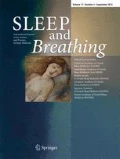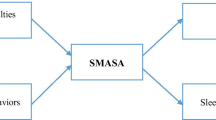Abstract
Purpose
Poor sleep and heavy use of caffeinated beverages have been implicated as risk factors for a number of adverse health outcomes. Caffeine consumption and use of other stimulants are common among college students globally. However, to our knowledge, no studies have examined the influence of caffeinated beverages on the sleep quality of college students in Southeast Asian populations. We conducted this study to evaluate the patterns of sleep quality and to examine the extent to which poor sleep quality is associated with consumption of energy drinks, caffeinated beverages, and other stimulants among 2,854 Thai college students.
Methods
A questionnaire was administered to ascertain demographic and behavioral characteristics. The Pittsburgh Sleep Quality Index was used to assess sleep habits and quality. Chi-square tests and multivariate logistic regression models were used to identify statistically significant associations.
Results
Overall, the prevalence of poor sleep quality was found to be 48.1 %. A significant percent of students used stimulant beverages (58.0 %). Stimulant use (odds ratios (OR) 1.50; 95 % confidence intervals (95 % CI) 1.28–1.77) was found to be statistically significant and positively associated with poor sleep quality. Alcohol consumption (OR 3.10; 95 % CI 1.72–5.59) and cigarette smoking (OR 1.43; 95 % CI 1.02–1.98) also had a statistically significant association with increased daytime dysfunction due to sleepiness. In conclusion, stimulant use is common among Thai college students and is associated with several indices of poor sleep quality.
Conclusion
Our findings underscore the need to educate students on the importance of sleep and the influences of dietary and lifestyle choices on their sleep quality and overall health.



Similar content being viewed by others
References
Curcio G, Ferrara M, De Gennaro L (2006) Sleep loss, learning capacity and academic performance. Sleep Med Rev 10(5):323–337
Ferrie JE, Kumari M, Salo P, Singh-Manoux A, Kivimaki M (2011) Sleep epidemiology—a rapidly growing field. Int J Epidemiol 40(6):1431–1437
Javaheri S, Storfer-Isser A, Rosen CL, Redline S (2008) Sleep quality and elevated blood pressure in adolescents. Circulation 118(10):1034–1040
Soares MJ, Macedo A, Bos SC, Maia B, Marques M, Pereira AT, Gomes AA, Valente J, Nogueira V, Azevedo MH (2011) Sleep disturbances, body mass index and eating behaviour in undergraduate students. J Sleep Res 20(3):479–486
Moo-Estrella J, Perez-Benitez H, Solis-Rodriguez F, Arankowsky-Sandoval G (2005) Evaluation of depressive symptoms and sleep alterations in college students. Arch Med Res 36(4):393–398
Pilcher JJ, Ginter DR, Sadowsky B (1997) Sleep quality versus sleep quantity: relationships between sleep and measures of health, well-being and sleepiness in college students. J Psychosom Res 42(6):583–596
Knutson KL (2012) Sociodemographic and cultural determinants of sleep deficiency: implications for cardiometabolic disease risk. Soc Sci Med. doi: 10.1016/j.socscimed.2012.05.002
Gaultney JF (2011) The prevalence of sleep disorders in college students: impact on academic performance. J Am Coll Health 59(2):91–97
Okun ML, Coussons-Read M, Hall M (2009) Disturbed sleep is associated with increased C-reactive protein in young women. Brain Behav Immun 23(3):351–354
Yu Y, Lu BS, Wang B, Wang H, Yang J, Li Z, Wang L, Liu X, Tang G, Xing H, Xu X, Zee PC, Wang X (2007) Short sleep duration and adiposity in Chinese adolescents. Sleep 30(12):1688–1697
Malinauskas BM, Aeby VG, Overton RF, Carpenter-Aeby T, Barber-Heidal K (2007) A survey of energy drink consumption patterns among college students. Nutr J 6:35
Seifert SM, Schaechter JL, Hershorin ER, Lipshultz SE (2011) Health effects of energy drinks on children, adolescents, and young adults. Pediatrics 127(3):511–528
Bunka D (2011) The drink of athletics, rock stars, college students…and your twelve year old! RxFiles, Saskatoon Health Region. http://www.rxfiles.ca/rxfiles. Accessed 16 July 2012
Tsai LL, Li SP (2004) Sleep patterns in college students: gender and grade differences. J Psychosom Res 56(2):231–237
Mak KK, Ho SY, Thomas GN, Lo WS, Cheuk DK, Lai YK, Lam TH (2010) Smoking and sleep disorders in Chinese adolescents. Sleep Med 11(3):268–273
Cheng SH, Shih CC, Lee IH, Hou YW, Chen KC, Chen KT, Yang YK, Yang YC (2012) A study on the sleep quality of incoming university students. Psychiatry Res 197(3):270–274
Tagaya H, Uchiyama M, Ohida T, Kamei Y, Shibui K, Ozaki A, Tan X, Suzuki H, Aritake S, Li L, Takahashi K (2004) Sleep habits and factors associated with short sleep duration among Japanese high-school students: a community study. Sleep Biol Rhythm 2(1):57–64
Nova P, Hernandez B, Ptolemy AS, Zeitzer JM (2012) Modeling caffeine concentrations with the Stanford Caffeine Questionnaire: preliminary evidence for an interaction of chronotype with the effects of caffeine on sleep. Sleep Med 13(4):362–367
Snel J, Lorist MM (2011) Effects of caffeine on sleep and cognition. Prog Brain Res 190:105–117
Reissig CJ, Strain EC, Griffiths RR (2009) Caffeinated energy drinks—a growing problem. Drug Alcohol Depend 99(1–3):1–10
Koo BB, Dostal J, Ioachimescu O, Budur K (2008) The effects of gender and age on REM-related sleep-disordered breathing. Sleep Breath 12(3):259–264
Falavigna A, de Souza Bezerra ML, Teles AR, Kleber FD, Velho MC, Steiner B, Beckenkamp NL, Lazzaretti L, Barazzetti D, Abruzzi F, Baseggio N, de Braga GL, Ferrari P, de Souza MV (2011) Sleep disorders among undergraduate students in Southern Brazil. Sleep Breath 15(3):519–524
Ishak WW, Ugochukwu C, Bagot K, Khalili D, Zaky C (2012) Energy drinks: psychological effects and impact on well-being and quality of life—a literature review. Innov Clin Neurosci 9(1):25–34
Buysse DJ, Reynolds CF 3rd, Monk TH, Berman SR, Kupfer DJ (1989) The Pittsburgh Sleep Quality Index: a new instrument for psychiatric practice and research. Psychiatry Res 28(2):193–213
WHO (2004) Global status report on alcohol. World Health Organization, Department of Mental Health and Substance Abuse, Geneva
Freiberg MS, Cabral HJ, Heeren TC, Vasan RS, Curtis Ellison R (2004) Alcohol consumption and the prevalence of the metabolic syndrome in the US: a cross-sectional analysis of data from the Third National Health and Nutrition Examination Survey. Diabetes Care 27(12):2954–2959
WHO (1995) Physical status: the use and interpretation of anthropometry. Report of a WHO Expert Committee. World Health Organization, Geneva
Rothman KJ, Greenland S, Lash TL (2008) Modern epidemiology. Wolters Kluwer Health, Philadelphia
Suen LK, Hon KL, Tam WW (2008) Association between sleep behavior and sleep-related factors among university students in Hong Kong. Chronobiol Int 25(5):760–775
Roehrs T, Roth T (2001) Sleep, sleepiness, sleep disorders and alcohol use and abuse. Sleep Med Rev 5(4):287–297
Ancoli-Israel S, Roth T (1999) Characteristics of insomnia in the United States: results of the 1991 National Sleep Foundation Survey. I. Sleep 22(Suppl 2):S347–S353
Kenney SR, LaBrie JW, Hummer JF, Pham AT (2012) Global sleep quality as a moderator of alcohol consumption and consequences in college students. Addict Behav 37(4):507–512
Lund HG, Reider BD, Whiting AB, Prichard JR (2010) Sleep patterns and predictors of disturbed sleep in a large population of college students. J Adolesc Health 46(2):124–132
Luo M, Feng Y, Li T (2012) Sleep medicine knowledge, attitudes, and practices among medical students in Guangzhou, China. Sleep Breath. doi: 10.1007/s11325-012-0743-x
Bootzin RR, Stevens SJ (2005) Adolescents, substance abuse, and the treatment of insomnia and daytime sleepiness. Clin Psychol Rev 25(5):629–644
Wetter DW, Young TB, Bidwell TR, Badr MS, Palta M (1994) Smoking as a risk factor for sleep-disordered breathing. Arch Intern Med 154(19):2219–2224
Phillips BA, Danner FJ (1995) Cigarette smoking and sleep disturbance. Arch Intern Med 155(7):734–737
Heckman MA, Sherry K, De Mejia EG (2010) Energy drinks: an assessment of their market size, consumer demographics, ingredient profile, functionality, and regulations in the United States. Compr Rev Food Sci Food Saf 9(3):303–317
Yang CK, Kim JK, Patel SR, Lee JH (2005) Age-related changes in sleep/wake patterns among Korean teenagers. Pediatrics 115(1 Suppl):250–256
Bjorness TE, Greene RW (2009) Adenosine and sleep. Curr Neuropharmacol 7(3):238–245
Davis JM, Zhao Z, Stock HS, Mehl KA, Buggy J, Hand GA (2003) Central nervous system effects of caffeine and adenosine on fatigue. Am J Physiol Regul Integr Comp Physiol 284(2):R399–R404
Landolt HP (2012) “No thanks, coffee keeps me awake”: individual caffeine sensitivity depends on ADORA2A genotype. Sleep 35(7):899–900
Wiklund U, Karlsson M, Ostrom M, Messner T (2009) Influence of energy drinks and alcohol on post-exercise heart rate recovery and heart rate variability. Clin Physiol Funct Imaging 29(1):74–80
Yunusa I, Ahmad IM (2012) Energy-drinks: composition and health benefits. Bayero J Pure Appl Sci 4(2):186–191
Taylor DJ, Bramoweth AD (2010) Patterns and consequences of inadequate sleep in college students: substance use and motor vehicle accidents. J Adolesc Health 46(6):610–612
Eliasson AH, Lettieri CJ (2010) Early to bed, early to rise! Sleep habits and academic performance in college students. Sleep Breath 14(1):71–75
Acknowledgments
H.K. and G.C. were research training fellows with the Multidisciplinary International Research Training Program of the Harvard University School of Public Health when this research study was completed. The Multidisciplinary International Research Program is supported by an award from the National Institutes of Health, National Institute on Minority Health and Health Disparities (T37-MD000149).
Conflict of interest
None to declare.
Author information
Authors and Affiliations
Corresponding author
Additional information
Hazar Khidir and Gardenia Casillas contributed equally to this work.
Rights and permissions
About this article
Cite this article
Lohsoonthorn, V., Khidir, H., Casillas, G. et al. Sleep quality and sleep patterns in relation to consumption of energy drinks, caffeinated beverages, and other stimulants among Thai college students. Sleep Breath 17, 1017–1028 (2013). https://doi.org/10.1007/s11325-012-0792-1
Received:
Revised:
Accepted:
Published:
Issue Date:
DOI: https://doi.org/10.1007/s11325-012-0792-1




